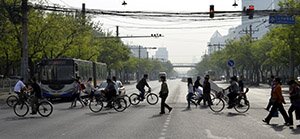 Climate change is a global challenge. It requires determined action from stakeholders in all parts of the world, but in particular from those responsible for the largest past and present greenhouse gas emissions.
Climate change is a global challenge. It requires determined action from stakeholders in all parts of the world, but in particular from those responsible for the largest past and present greenhouse gas emissions.
The transport sector contributes more than a quarter of global energy-related CO2 emissions [1]. While many other sectors have begun to level out or reduce their emissions, global transport emissions continue to grow at a rapid pace and an absolute peak is not yet in sight. Especially in China unprecedented economic growth and urbanisation have led to mind-boggling growth rates of individual motorised transport, as well as freight transport. Over the last five years, the growth rate of private vehicle ownership averaged 28% per year [2]. As key actors in the global economy and community of nations, China and Germany cooperate to develop a sustainable low carbon transport sector. GIZ supports Chinese national and local authorities and policy institutes in developing mitigation strategies and policies based on emission quantification and policy analysis.
We offer technical expertise and support on:
• Developing holistic sector strategies based on scientific analysis
• Developing national transport scenarios
• Designing urban transport mitigation policies and measures
• Accounting past, present and future GHG emissions at the city level
All posts on Climate Change can be found here.
Our Partners include, amongst others, the National Development and Reform Commission (NDRC), the Ministry of Transport (MoT), the China Urban Sustainable Transport Research Centre (CUSTReC), as well as the Energy Research Institute (ERI).
For more information on the UNFCCC climate change negotiation related work of GIZ in Germany, please also see the webpages of the Bridging the Gap Initiative of which GIZ is a founding member and the TRANSfer Project on transport NAMAs.


